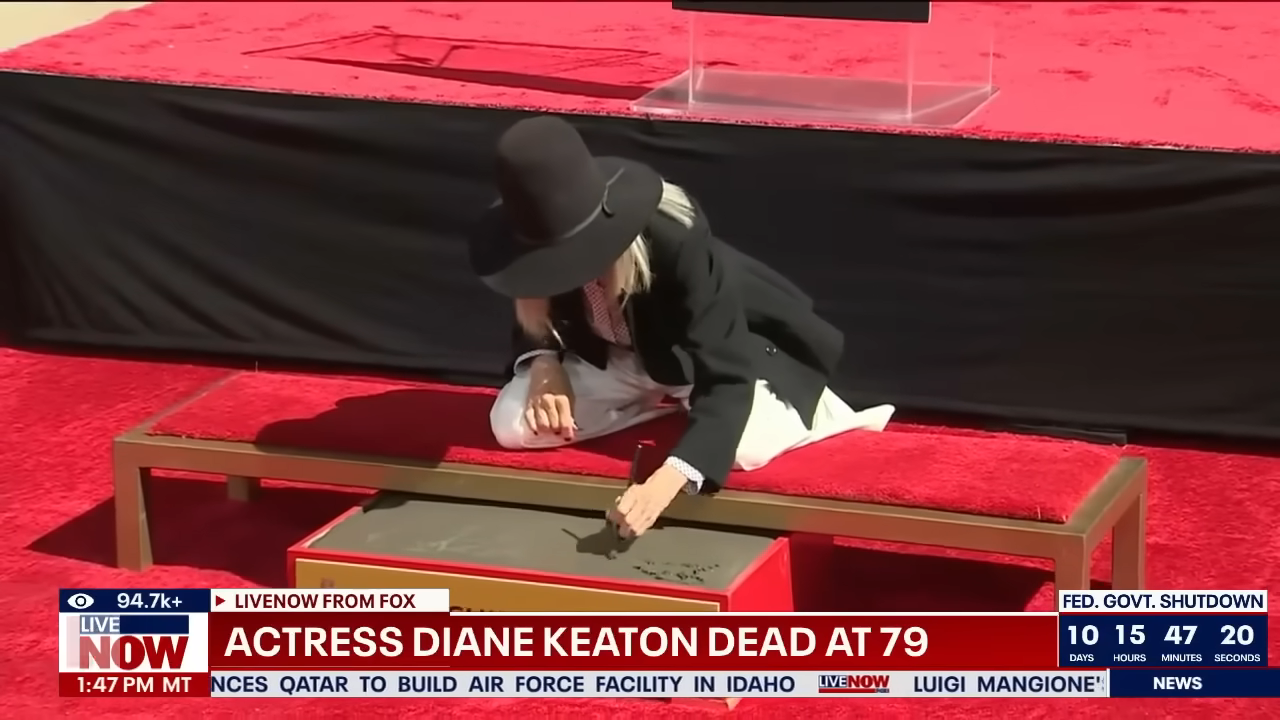The entertainment world was rocked today by the news of Diane Keaton’s passing. She was 79. Fans, friends, and the film industry alike are grappling with the loss of a true legend—a woman whose career spanned over five decades and whose influence on Hollywood and beyond is immeasurable. While the official cause of death has yet to be disclosed, Keaton’s death marks the end of an era for a star who redefined what it meant to be a woman in film.
Diane Keaton wasn’t just a Hollywood actress—she was a trailblazer, an icon. From her early days in The Godfather to her Oscar-winning role in Annie Hall, she broke barriers, not just in terms of her acting but in how she presented herself to the world. She wasn’t afraid to be different, to embrace quirks and flaws, and in doing so, she created some of the most memorable and beloved characters in cinema history.
The Rise of Diane Keaton: From Broadway to Hollywood Stardom
Keaton’s career began in the theater, where she performed on Broadway in Hair and later starred in Play It Again, Sam. But it wasn’t until director Francis Ford Coppola cast her as Kay Adams in The Godfather (1972) that Keaton’s name became synonymous with Hollywood greatness. Her performance as Michael Corleone’s (Al Pacino) wife showcased her ability to mix strength and vulnerability in a way that was unprecedented at the time. But it was her iconic role as Annie Hall in 1977 that truly solidified her as a force in Hollywood.
Winning an Academy Award for Best Actress for Annie Hall made Keaton a household name. The role, which she effortlessly brought to life, was a blend of neurotic humor, depth, and authenticity—qualities that Keaton herself embodied off-screen. Her quirky, offbeat style became as much a part of her persona as her acting, and her character’s wardrobe—featuring menswear-inspired pieces like vests and oversized trousers—became iconic.
Keaton’s filmography continued to grow with roles in The Godfather Part II (1974), Something’s Gotta Give (2003), and The First Wives Club (1996). Her range was staggering, effortlessly moving between comedy and drama, sometimes within the same film. In Something’s Gotta Give, for example, Keaton played Erica, a successful woman who finds love later in life. The film was not just about romance—it was about the complexity of aging, the challenge of navigating relationships, and the humor in life’s surprises.
Diane Keaton’s Personal Life: Living Authentically
While Keaton was a household name, she was not one to conform to Hollywood’s expectations. Unlike many of her contemporaries, she never married, despite being romantically linked to some of Hollywood’s most famous men, including Warren Beatty and Al Pacino. In interviews, she spoke candidly about her decision to stay single, citing her desire for independence. She once said, “I don’t want to be a wife. I’m an oddball.”

Her independence extended to her decision to become a mother later in life. Keaton adopted two children, Dexter and Duke, in her 50s, marking a departure from traditional family structures and giving voice to a different path for women. She never saw motherhood as something she had to do but something she wanted to do. Her children became her anchor in a life lived in the spotlight, and she often spoke about how her own mother inspired her approach to family life.
In addition to motherhood, Keaton was a passionate photographer, director, and author. Her photography, which spanned from intimate portraits to architectural studies, revealed the depth of her creative spirit. Her memoir, Then Again, published in 2011, offered fans a rare look into her personal life, revealing the stories behind her rise to fame, her struggles with bulimia, and the inspiration she drew from her family and personal experiences.
Diane Keaton’s Health Struggles: A Public and Private Battle
Though Keaton’s career was nothing short of extraordinary, she didn’t face her battles without challenges. Throughout her life, Keaton was open about her health struggles, including her long battle with bulimia, which she developed in her early days in Hollywood. In interviews, she shared how the pressures of the industry and a demanding career contributed to her struggles with body image. Despite these challenges, Keaton sought therapy and managed to overcome her disorder, offering hope to others who faced similar battles.
In recent months, sources close to the actress had noted that her health had been in sharp decline. While the official cause of death has yet to be confirmed, many close to her have spoken of how her health had deteriorated quite suddenly. The family has requested privacy during this difficult time, which is not uncommon following the passing of public figures.
A Legacy That Will Last Forever
Diane Keaton’s legacy is immeasurable. She didn’t just entertain; she challenged societal norms and redefined what it meant to be a woman in Hollywood. She proved that women could be strong, vulnerable, quirky, and complex all at once. She made us laugh, made us cry, and above all, she made us think differently about aging, independence, and love.
In her 2019 interview with People magazine, Keaton reflected on her career, saying, “I don’t know anything, and I haven’t learned. Getting older hasn’t made me wiser. Without acting, I would have been a misfit.” This humility, despite a lifetime of success, is what made her relatable. Keaton’s authenticity wasn’t just part of her persona—it was her very essence.
As we process the news of her passing, we are reminded that Diane Keaton’s films and her life story will continue to inspire. She may be gone, but the characters she played, the roles she redefined, and the authentic woman she was will never be forgotten.
Table: Diane Keaton’s Biography
| Attribute | Details |
|---|---|
| Full Name | Diane Hall Keaton |
| Date of Birth | January 5, 1946 |
| Date of Death | October 11, 2025 |
| Age at Death | 79 |
| Place of Birth | Los Angeles, California, USA |
| Famous For | The Godfather (1972), Annie Hall (1977), Father of the Bride (1991), The First Wives Club (1996) |
| Oscar Nominations | Best Actress for Annie Hall (1977) |
| Other Professions | Author, Photographer, Director |
| Personal Life | Never married, adopted two children (Dexter and Duke) |
| Notable Health Struggles | Bulimia, skin cancer |
For more on Diane Keaton’s legacy and career, visit People.com.
Though the details of her passing remain private, Diane Keaton’s influence will forever be etched in the fabric of Hollywood. She was, and always will be, an icon whose authenticity, talent, and courage reshaped an entire industry.
